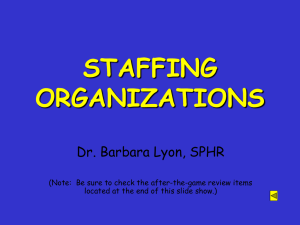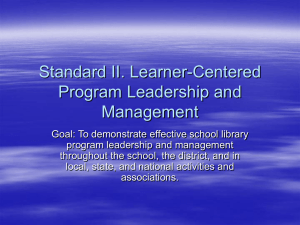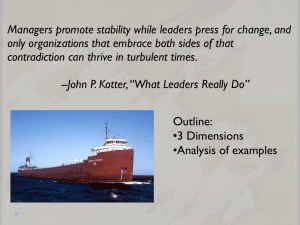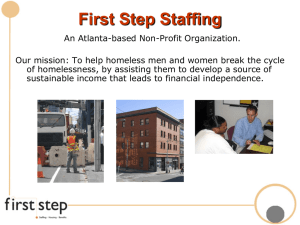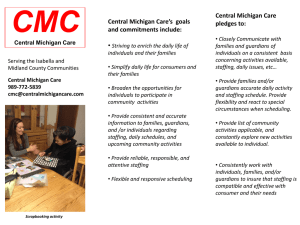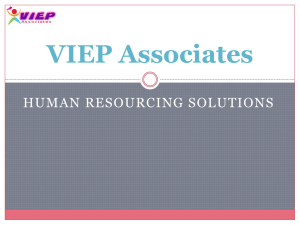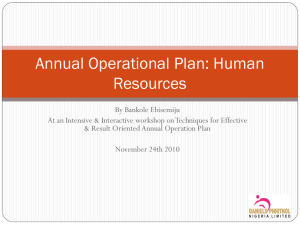In Search Of Excellence In Project Management
advertisement
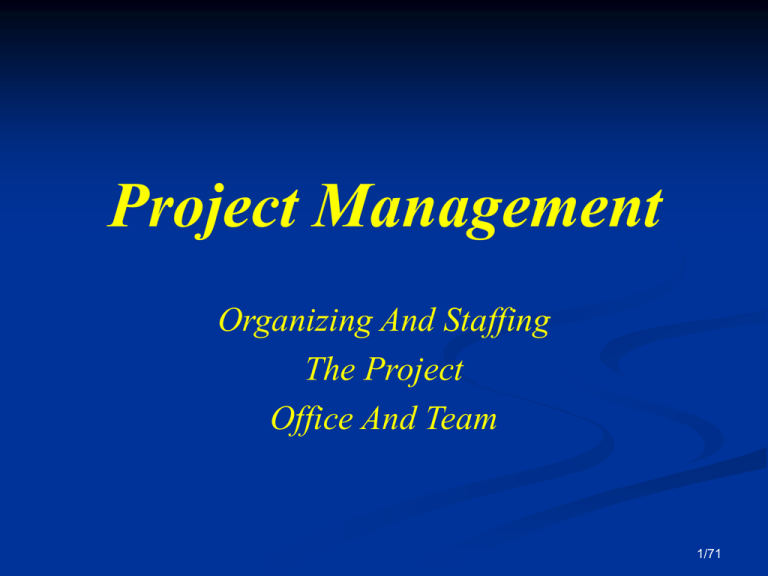
Project Management Organizing And Staffing The Project Office And Team 1/71 Outline 1. 2. 3. 4. 5. 6. 7. 8. Introduction The Staffing Environment Selecting the project Manager Skill Requirement for Project and Program Manager Special Case for Project Manager Selection Selecting the Wrong project Manager Next Generation Project Managers Duties and Job Descriptions 2/71 Outline (Continued) 8. The Organizational Staffing Process 9. The Project Office 10. The Functional Team 11. The Project Organizational Chart 12. Special Problems 13. Selecting the Project management Implementation Team 3/71 Introduction Project Personnel includes: A project manager An assistant project manager (if necessary) A project (home) office A project team 4/71 The Staffing Environment Staffing questions to ask: What are the requirements for an individual to become a successful project manager? Who should be a member of the project team? Who should be a member of the project office? What problems can occur during recruiting activities? What can happen downstream to cause the loss of key team members? 5/71 The Staffing Environment (Continued) Project manager’s skills needed: Honesty and integrity Understanding of personnel problems Understanding of project technology Business management competence Management principles Communications Alertness and quickness Versatility Energy and toughness Decision-making ability Ability to evaluate risk and uncertainty 6/71 Selecting the Project Manager: Executive Consideration Acquire the best available assets and try to improve them Provide a good working environment for all personnel Make sure that all resources are applied effectively and efficiently so that all constraints are met, if possible 7/71 Project Manager Selection A project manager is given a license to cut across several organizational lines. His activities, therefore, take on a flavor of general management, and must be done well. Project management will not succeed without good project managers. Thus, if general management sees fit to establish a project, it should certainly see fit to select a good person as its leader. 8/71 Project Manager Selection (Continued) A project manager is far more likely to accomplish desired goals if it is obvious that general management has selected and appointed him. 9/71 Selection Process for Project Manager Questions to ask: What are the internal and external sources? How do we select? How do we provide career development in project management? How can we develop project management skills? How do we evaluate project management performance? 10/71 Project Manager’s Responsibilities To produce the end-item with the available resources and within the constraints of time, cost, and performance/technology To meet contractual profit objectives To make all required decisions whether they be for alternatives or termination To act as the customer (external) and upperlevel and functional management (internal) communications focal point 11/71 Project Manager’s Responsibilities (Continued) To “negotiate” with all functional disciplines for accomplishment of the necessary work packages within the constraints of time, cost, and performance/technology To resolve all conflicts, if possible 12/71 Personal Characteristics for Project Manager Flexibility and adaptability Preference for significant initiative and leadership Aggressiveness, confidence, persuasiveness, verbal fluency Ambition, activity, forcefulness Effectiveness as a communicator and integrator Broad scope of personal interests Poise, enthusiasm, imagination, spontaneity13/71 Personal Characteristics for Project Manager Able to balance technical solutions with time, cost, and human factors Well organized and disciplined A generalist rather than a specialist Able and willing to devote most of his time to planning and controlling Able to identify problems Willing to make decisions Able to maintain proper balance in the use of 14/71 time Additional Skills Needed Are feasibility and economic analyses necessary? Is complex technical expertise required? If so, is it within the individual’s capabilities? If the individual is lacking expertise, will there be sufficient backup strength in the line organizations? Is this the company’s or the individual’s first exposure to this type of project and/or client? If so, what are the risks to be considered? 15/71 Additional Skills Needed (Continued) What is the priority for this project, and what are the risks? With whom must the project manager interface, both inside and outside the organization? 16/71 Worker Skills They must know what they are supposed to do, preferably in terms of an end product. They must have a clear understanding of their authority and its limits. They must know what their relationship with other people is. They should know where and when they are falling short. 17/71 Worker Skills (Continued) They must be made aware of what can and should be done to correct unsatisfactory results. They must feel that their superior has an interest in them as individuals. They must feel that their superior believes in them and is anxious for their success and progress. 18/71 Skill Requirement for Project and Program Managers Team building Leadership Conflict resolution Technical expertise Planning Organization Entrepreneurship 19/71 Skill Requirement for Project and Program Managers (Continued) Administration Management support Resource allocation 20/71 Team Building Skills Team members committed to the program Good interpersonal relations and team spirit The necessary expertise and resources Clearly defined goals and program objectives Involved and supportive top management Good program leadership 21/71 Team Building Skills (Continued) Open communication among team members and support organizations A low degree of detrimental interpersonal and intergroup conflict 22/71 Leadership Skills Clear project leadership and direction Assistance in problem solving Facilitating the integration of new members into the team Ability to handle interpersonal conflict Facilitating group decisions Capability to plan and elicit commitments Ability to communicate clearly 23/71 Leadership Skills (Continued) Presentation of the team to higher management Ability to balance technical solutions against economic and human factors 24/71 Conflict Resolution Skills Understand interaction of the organizational and behavioral elements in order to build an environment conducive to their team’s motivational needs. This will enhance active participation and minimize unproductive conflict. Communicate effectively with all organizational levels regarding both project objectives and decisions. Regularly scheduled status review meetings can be an important communication vehicle. 25/71 Conflict Resolution Skills (Continued) Recognize the determinants of conflict and their timing in the project life cycle. Effective project planning, contingency planning, securing of commitments, and involving top management can help to avoid or minimize many conflicts before they impede project performance. 26/71 Technical Skills Technology involved Engineering tools and techniques employed Specific markets, their customers, and requirements Product applications Technological trends and evolutions Relationship among supporting technologies People who are part of the technical community 27/71 Planning Skills Information processing Communication Resource negotiations Securing commitments Incremental and modular planning Assuring measurable milestones Facilitating top management involvement 28/71 Organizational Skills Defining the reporting relationship Defining responsibility Defining lines of control Defining information needed Defining program objectives Opening communication channel Obtaining senior management supports 29/71 Special Cases in project Manager Selection Part-time versus full-time assignments Several projects assigned to one project manager Projects assigned to functional managers The project manager’s role retained by the general manager 30/71 Selecting the Wrong Project Manager--Risks The greater the project manager’s technical expertise, the higher the propensity that he will overly involve himself in the technical details of the project. The greater the project manager’s difficulty in delegating technical task responsibilities, the more likely it is that he will overinvolve himself in the technical details of the project. (Depending upon his expertise to do so). 31/71 Risks (Continued) The greater the project manager’s interest in the technical details of the project, the more likely it is that he will defend the project manager’s role as one of a technical specialist. The lower the project manager’s technical expertise, the more likely it is that he will overstress the non-technical project functions (administrative functions). 32/71 Next Generation Project Manager The primary skills needed to be an effective project manager in the 21st century are: Knowledge of business Risk management Integration skill 33/71 Changing skills needed in the 21st century for the Project Managers 34/71 How Do Project Managers Spend Their Time? 35/71 Duties and Job Descriptions (Continued) 36/71 Duties and Job Descriptions (Continued) 37/71 Duties and Job Descriptions (Continued) 38/71 The Organizational Staffing Process Recruitment Concerns Line mangers often receive no visibility or credit for a job well done. Be willing to introduce line managers to the customer. Be sure to show people how they can benefit by working for you or on your project. Any promises made during recruitment should be documented. The functional organization will remember them long after your project terminates. 39/71 The Organizational Staffing Process (Continued) Recruitment Concerns As strange as it may seem, the project manager should encourage conflicts to take place during recruiting and staffing. These conflicts should be brought to the surface and resolved. It is better for conflicts to be resolved during the initial planning stages than to have major confrontations later. 40/71 Recruitment Policy Unless some other condition is paramount, project recruiting policies should be as similar as possible to those normally used in the organization for assigning people to new jobs. Everyone should be given the same briefing about the project, this rule can be modified to permit different amounts of information to be given to different managerial levels, but at least everyone in the same general classification should get the same briefing. It should be complete and accurate. 41/71 Recruitment Policy (Continued) Any commitments made to members of the team about treatment at the end of the project should be approved in advance by general management. No other commitments should be made. Every individual selected for a project should be told why he or she was chosen. A similar degree of freedom should be granted all people, or at least all those within a given job category, in the matter of accepting or declining a project assignment. 42/71 Degrees of Permissiveness The project is explained and the individual is asked to join and given complete freedom to decline, no questions asked. The individual is told he will be assigned to the project. However, he is invited to bring forward any reservations he may have about joining. Any sensible reason he offers will excuse him from the assignment. 43/71 Degrees of Permissiveness (Continued) The individual is told he is assigned to the project. Only a significant personal or career preference is accepted as a reason for excusing him from joining the project. The individual is assigned to the project as he would be to any other work assignment. Only an emergency can excuse him from serving on the project team. 44/71 Staffing Pattern Versus Time STAFFING CONSTANT MANPOWER RELEASE TO OTHER PROJECTS OR FUNCTIONAL GROUPS RAMP UP FROM OTHER PROJECTS OR FUNCTIONAL GROUPS TIME (LIFE CYCLE PHASES) 45/71 The Project Office -- Organization FUNCTIONAL MANAGERS ASST. PROJ. MGRS. PROJECT MANAGER EMPLOYEES PROJECT OFFICE PROJECT TEAM 46/71 Special Problems Personnel connected with project forms of organization suffer more anxieties about possible loss of employment than members of functional organizations. Individuals temporarily assigned to matrix organizations are more frustrated by authority ambiguity than permanent members of functional organizations. 47/71 Special Problems (Continued) Personnel connected with project forms of organization that are nearing their phaseout are more frustrated by what they perceive to be “make work” assignments than members of functional organizations. Personnel connected with project forms of organization feel more frustrated because of lack of formal procedures and role definitions than members of functional organizations. 48/71 Special Problems (Continued) Personnel connected with project forms of organization worry more about being set back in their careers than members of functional organizations. Personnel connected with project forms of organization feel less loyal to their organization than members of functional organizations. 49/71 Special Problems (Continued) Personnel connected with project forms of organization have more anxieties in feeling that there is no one concerned about their personal development than members of functional organizations. Permanent members of project forms or organization are more frustrated by multiple levels of management than members of functional organizations. 50/71 Special Problems (Continued) Frustrations caused by conflict are perceived more seriously by personnel connected with project with project forms of organization than members of functional organizations. People trained in single line-of-command organizations find it hard to serve more than one boss. 51/71 Special Problems (Continued) People may give lip service to teamwork, but not really know how to develop and maintain a good working team. Project and functional managers sometimes tend to compete rather than cooperate with each other. Individuals must learn to do more “managing” of themselves. 52/71 Assigning Project Managers Promote the individual in salary and grade and transfer him into project management. Laterally transfer the individual into project management without any salary or grade increase. If, after three to six months, the employee demonstrates that he can perform, he will receive an appropriate salary and grade increase. 53/71 Assigning Project Managers (Continued) Give the employee a small salary increase without any grade increase or a grade increase without any salary increase, with the stipulation that additional awards will be forthcoming after the observation period, assuming that the employee can handle the position. 54/71 People Roles Which Undermine Project Management Implementation The Aggressor The Blocker The Withdrawer Dominator Destructive Roles Recognition Seeker Devil’s Advocate Topic Jumper 55/71 Destructive Roles The Aggressor Criticizes Everybody and Everything on Project Management Deflates Status and Ego of Others Always Aggressive 56/71 Destructive Roles Dominator Always Tries to Take Over Professes to Know Everything About Project Management Tries to Manipulate People Will Challenge Your Leadership 57/71 Destructive Roles Devil’s Advocate Finds Fault in All Areas of Project Management Refuses to Become a Believer Unless Threatened More Devil Than Advocate 58/71 Destructive Roles Topic Jumper Must Be the First with a New Idea/Approach for Project Management Continuously Changes Topics Cannot Focus on Issues for a Long Time Unless It Is His/Hers Project Management Implementation Remains an “Action Item” Forever 59/71 Destructive Roles Recognition Seeker Always Argues in Favor of His/Her Own Ideas Is Very Status Conscious Volunteers to Become the Project Manager If Status Is Recognized Continuous Talks (Likes to Hear Himself/Herself Speak) Often Boasts Rather Than Providing Meaningful Information 60/71 Destructive Roles The Withdrawer Is Afraid of Criticism Will Not Participate Openly Withholds Information May Become a Back-Stabber May Be Shy 61/71 Destructive Roles The Blocker Likes to Criticize Rejects the Views of Others Cites Unrelated Examples and Personal Experiences Has Multiple Reasons Why Project Management Will Not Work 62/71 People Roles Which Support Project Management Implementation Initiators Gate Keepers Consensus Takers Information Seekers Supportive Roles Information Givers Encouragers Harmonizers Clarifiers 63/71 Supportive Roles Initiators “Is There a Chance That This Might Work?” “Let’s Try This!” 64/71 Supportive Roles Information Seekers “Have We Tried Anything Like This Before?” “Do We Know Other Companies Where This Has Worked?” “Can We Get This Information?” 65/71 Supportive Roles Information Givers “Other Companies Found That …..” “The Literature Says That …..” “Benchmarking Studies Indicate That …...” 66/71 Supportive Roles Encouragers “Your Idea Has a Lot of Merit.” “The Idea Is Great But We May Have to Make a Small Change.” “What You Said Will Really Help Us.” 67/71 Supportive Roles Clarifiers “Are We Saying That …..” “Let Me State in My Own Words What I Think You Said.” “Let’s See if We Can Put This Into Perspective.” 68/71 Supportive Roles Harmonizers “We Sort of Agree, Don’t We?” “Your Ideas and Mine Are Close Together.” “Aren’t We Saying the Same Thing?” 69/71 Supportive Roles Consensus Takers “Let’s See if We Are in Agreement.” “Let’s Take a Vote on This.” “Let’s See How the Rest of the Group Feels About This.” 70/71 Supportive Roles Gate Keepers “Who Hasn’t Given Us Their Opinions on This yet?” “Should We Keep Our Options Open?” “Are We Prepared to Make a Decision or Recommendation, or Is There Additional Information to Be Reviewed?” 71/71

